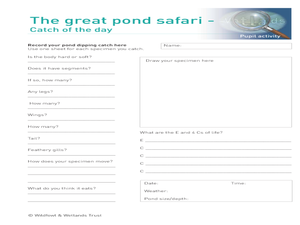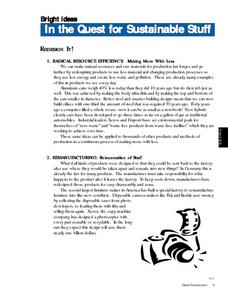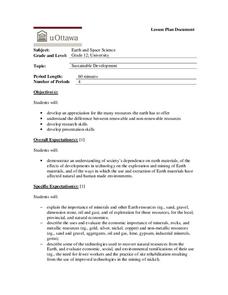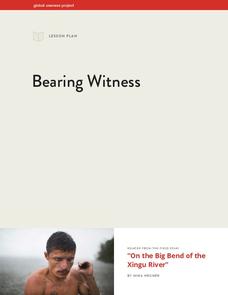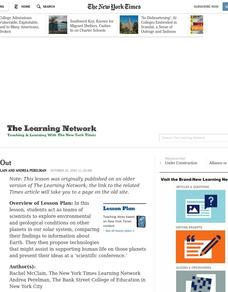Curated OER
Endangered Animals: Hawaii
Students locate regions in Hawaii where specific endangered animals live. They describe habitats, identify reasons why the species has become endangered, consider how a healthy environment for wildlife contributes to a healthy...
Curated OER
How We're Connected
Students take a survey in order to find out how they live in relationship to the environment. They take the time to investigate the differences between a need and a want. This is done as part of the self-assessment. Students also study...
Curated OER
Water and Sanitation
Students examine water contamination problems. In this global studies lesson, students compare and contrast water sanitation issues on Malawi, Tanzania, and Ontario. Students propose solutions to the water sanitation problems.
Curated OER
Waves : An Alternative Energy Source
Students evaluate the feasibility of wave energy as an alternative source of energy. In this alternative energy source instructional activity students are introduced to renewable and nonrenewable energy and study energy production.
Curated OER
Renewable Resources: Ancient Civilizations
Students examine how ancient people used natural resources. In this renewable resource instructional activity, students will be put into 5 groups each focusing on a different past civilization. Each group will identify they types of...
Curated OER
Pond Safari
Students investigate organisms and animals by examining a nearby pond. In this ecosystem lesson, students participate in a field trip to a local pond where they utilize a net to gather animals, plants and pollution items, Students...
Curated OER
Biomimicry: Working Together, Cooperative Design
Students explore the concept of biomimicry. In this cooperative design lesson, students consider how cooperation is connected to nature and then collaborate to create their own cooperative designs for the future.
Curated OER
The World in Our Food
Students explore the history of ingredients in one of the recipes they prepare in class. They examine where each ingredient is produced and under what conditions. In addition, they brainstorm alternatives that are environmentally...
Curated OER
Using Logos and Mission Statements to Communicate Sustainable Forestry Information
Young scholars survey forestry foundations to see how they represent important information into their logos and mission statements. For this forestry lesson plan, students use the information to better understand visual representations...
Curated OER
In The Quest For Sustainable Stuff
In this environment learning exercise, students read nine pages about recycling and focus upon how products can be produced to help save the environment.
Curated OER
Sustainable Development
Twelfth graders explore the difference between natural and man-made environments. In this renewable resources lesson students evaluate the economic importance of resources.
Curated OER
Sustainable Southern Belize: Coral Health Lesson Plan
Fifth graders investigate coral reefs and the dangers they face by labeling and drawing. In this oceanography lesson, 5th graders view a PowerPoint presentation of photographs of coral reefs in Belize. Students investigate...
Curated OER
An Exploration of Cradle-to-Cradle Design Thinking
Introduce cradle-to-cradle design thinking. Scholars first discuss the importance of natural laws and rights. They then use a variety of online and print resources to research eco-efficiency and cradle-to-cradle design.
Practical Action
Climate Change - Who's In Control?
How can both individuals and governments respond to climate change and take responsibility to reduce its effects on our environment? Here you will find three lessons filled with discussion, debate, and role-playing...
Global Oneness Project
Bearing Witness
A controversial construction project in South America, the Belo Monte dam, is endangering local cultures, ecosystems, and communities. High schoolers create a concept map based on an online article they read before engaging in...
Global Oneness Project
Deconstructing Consumerism
A short, engaging video provides a critique of the hyper-consumerist mentality that many think have taken over the Western world. After watching the video, pupils reflect on their own habits and use evidence...
California Academy of Science
Our Hungry Planet: Design Thinking Challenge
Scholars investigate an issue associated with food systems and design their own solutions. Working collaboratively, they follow each step in the design process to complete the 10th lesson of the 13-part Our Hungry Planet series.
Wild BC
Greenhouse Gas Guzzlers
Teams of six to eight players imagine that they are driving in a vehicle and collect balls that represent carbon dioxide emissions based on their different activities. "Greenhouse Gas Guzzler" cards tell teams how many balls to collect...
California Academy of Science
Exploring the Impacts of Feeding the World
Approximately 50 percent of people in the world who are chronically hungry work in agriculture. While it seems counter-intuitive, the farther you live from a farm, the more food options are available. Scholars explore concepts related to...
Curated OER
Energy Conservation Lesson 1: Fossil Fuels and the Ticking Clock
Students explore energy production by participating in a class discussion. In this renewable energy instructional activity, students discuss the differences between solar, coal, wind and fossil fuel energy sources and why some are better...
Curated OER
Fishing For The Future
Students participate in a simulation using M&M's that highlights Garrett Hardin's concept of the "tragedy of the commons." They use the activities to study sustainability issues in the fishing industry.
Curated OER
Spacing Out
Students explore environmental and geological conditions on other planets in our solar system, comparing their findings to information about Earth. They propose technologies that might assist in supporting human life on those planets.
Curated OER
Wedge Game
Students explore the Carbon Mitigation Initiative by playing the Wedge Game. For this environmental science lesson, students discuss different strategies to reduce carbon emissions. They evaluate their strategies and rate sustainability.
Curated OER
Earth Day Activities
Earth Day is April 22nd - you can celebrate by incorporating some environmental activities into your curriculum Code: F7G4U8JHCDTD.







